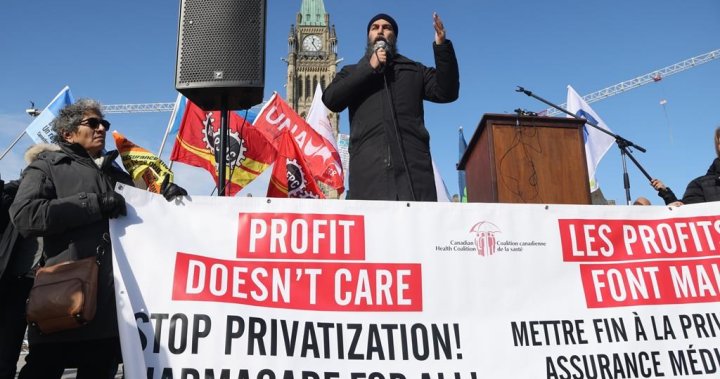The NDP has reached a deal with the Liberal government to introduce the first piece of a national pharmacare program that includes coverage for birth control and diabetes medication, NDP Leader Jagmeet Singh said Friday.
The deal is a critical piece of the supply-and-confidence agreement between the two parties and comes ahead of a March 1 deadline to table legislation. News of the deal was first reported by The Canadian Press.
“Pharmacare means that you will get the medicine you need with your health card, not a credit card,” Singh said on social media while touting the deal.
“Now, millions of Canadians will save money and have better health.”
An NDP source speaking on background to Global News said the deal “satisfies our end” of the supply-and-confidence pact.
Some final details may still be worked out over the weekend, but the source said the NDP expects the legislation will be tabled by the March 1 deadline.
A government source confirmed the deal had been reached and said more details would be announced next week.

The NDP says the deal includes full coverage for contraceptives close to what British Columbia covers, which includes birth control pills, IUDs and emergency contraception.
Get the latest Health IQ news.
Sent to your email, every week.
It also includes insulin for Type 1 and Type 2 diabetes, as well as additional diabetes drugs. The focus is on covering generics where there is an option to do so, the NDP source said. Ozempic, a new drug for diabetes that has been used off-label as a weight-loss drug, will not be covered under the agreement.
The deal also puts forward a fund to help provinces cover the cost of insulin pumps for diabetes patients, which the NDP wanted maximum coverage for, the source said.
All provinces cover 80 per cent of out-of-pocket costs for youth with Type 1 diabetes, but the coverage for adults with Type 2 diabetes varies widely — from zero per cent in Nova Scotia, New Brunswick and Alberta to a high of 62 per cent in Ontario, data from Diabetes Canada show.
It means that depending on their location households can be out thousands of dollars a year for diabetes medicines and supplies.
Ontario also provides many contraceptives for people under the age of 25 who don’t have private insurance. Manitoba’s government has already pledged to do so as well.
Abortion pills, which are different than morning-after pills, are already offered for free at pharmacies across Canada.
The New Democrats said birth control coverage will help millions of women and gender-diverse people.

The first deadline to reach a deal was pushed back in December, with both parties agreeing to extend it to March 1.
Singh had suggested failing to meet the March 1 deadline would result in “consequences” for the Liberals, but stopped short of explicitly saying his party would withdraw its support under the supply-and-confidence agreement. Such a move would potentially trigger an election, which the pact ensures won’t be held until 2025.
Liberals had previously cited concerns about the potential costs of pharmacare, even as the NDP pushed for the program to include more right off the bat.
If the federal government moves towards fully implementing national pharmacare, that wider program is expected to cost roughly $40 billion a year in total, the parliamentary budget officer said in a report last fall. The report said the incremental cost to the public sector, including federal and provincial governments, would rise from $11.2 billion in 2024-25 to $13.4 billion in 2027-28.
However, such a program was also estimated to lead to cost savings on drug expenditures of $1.4 billion in 2024-25, with that figure increasing to $2.2 billion by 2027-28.
As the deadline to reach a deal drew nearer, Holland said the Liberals made it clear an initial pharmacare program could not be “massively expensive.”
A source close to the pharmacare talks told the Canadian Press the Liberals made it clear they had about $800 million to spend for an initial program.
The Liberals campaigned on a promise to implement a national pharmacare program in the 2019 election, but made no such pledge when they went back to the polls in 2021.
—With files from the Canadian Press
© 2024 Global News, a division of Corus Entertainment Inc.




